Editorial
Aiyo, Aragalaya!

Thursday 3rd November, 2022
Opposition parties are in a perpetual state of confusion; they seem to be labouring under the delusion that united, they will fall, and divided, they can stand. The JVP not only refused to take part in yesterday’s protest march in Colombo but also disparaged the organisers thereof. It has said it will have no truck with opportunists!
The SJB, the SLFP and some trade unions have taken up the cudgels on behalf of the Aragalaya activists who are being detained and grilled under the Prevention of Terrorism Act. Their campaign is not devoid of politics; they are trying to mobilise the people in view of the local government elections expected early next year, but without such protests pressure cannot be brought to bear on the government to refrain from suppressing democratic dissent. The JVP has chosen to conduct a separate protest campaign, we are told. The disunity among oppositional forces must have gladdened the hearts of the government leaders, who may not have expected its political rivals to fall out and go for one another’s jugular so soon.
All it takes to ruin a people’s protest is a smidgeon of dirty politics. Politicians with hidden agendas polluted Aragalaya by infiltrating and politicising it to compass their ends. The Galle Face protest movement began as a popular agitation, which was similar, mutatis mutandis, to the wall painting campaign launched by the youth, immediately after the election of President Gotabaya Rajapaksa in celebration of what seemed to be a new beginning, which sadly turned out to be yet another false dawn. The occupation of the Galle Face Green reminded us of the Occupy Wall Street protest (2011) in New York.
The Galle Face agitation was a coming together of frustrated citizens from all walks of life, mostly youth, to protest against their hardships and pressure the government to make an urgent course correction on the economic front. That it emerged as a truly apolitical, leaderless protest became evident from the fact that even the JVP and the other Opposition parties warned that such agitations could lead to anarchy. When the Galle Face protest began to run out of steam for want of funds and direction, the JVP, the FSP, etc., moved in and hijacked it. Even the UNP has admitted that it had its activists mingling with the protesters.
The Galle Face protesters were like a group of unskilled workers pulling down a massive wall and exposing themselves to the danger of being buried alive in the process. They succeeded in ousting President Gotabaya Rajapaksa, but the Rajapaksa regime has got a new lease of life under Ranil Wickremesinghe’s presidency and is making up for lost time while the Opposition is exploiting the woes of the victims of the government’s witch-hunt in a bid to gain political mileage. Now, the Oppositional forces are on the defensive and divided!
This is not the first time the JVP has broken ranks with other Opposition parties and trade unions affiliated to them over a crucial national issue. One may recall that the JVP did something similar in July 1980, when the then SLFP-led Opposition and trade unions organised a general strike against the J. R. Jayewardene government, demanding a pay hike. It pulled out at the eleventh hour. The UNP crushed the strike ruthlessly, and sacked about 50,000 strikers. The Opposition accused the JVP of collaborating with the UNP.
The government seems to think Aragalaya is dead and gone, and the path is now clear for it to do as it pleases. True, ultra-radical political groups and various organisations with hidden agendas gave the Galle Face protest movement the kiss of death. The JVP has gained a turbo boost for its approval ratings, and the FSP is in seventh heaven. The SLPP has launched a reorganisation campaign, and the UNP is busy trying to shore up its image and support base, having secured the presidency. Some of the self-appointed leaders of Aragalaya have laughed all the way to the bank. But Aragalaya is far from dead. All the problems that drove the people to stage street protests remain unsolved. The economy is contracting; the cost of living is soaring; taxes and tariffs are increasing exponentially; hospitals are experiencing drug shortages; people are skipping meals, malnutrition is on the rise among children; corrupt deals continue to be struck; stress on the banking system is worsening; the abuse of power continues unabated, and the government is stepping up the suppression of dissent. There is a massive build-up of public anger in the polity. Unless the government holds the local government polls thereby providing the people with an opportunity to canalise their anger in a democratic manner, there will be another uprising.
Self-serving politicians, in power as well as in opposition, are creating conditions for a truly leaderless uprising, which will be fuelled by anti-politics. Let them be warned that none of them will be safe in such an eventuality. Given the huge increases in food prices and other essentials and the shortages thereof, the day may not be far off when we witness, in Colombo, something similar to the Women’s March on Versailles (1789) against food scarcities and the suppression of their rights, in Paris.
Editorial
Draining Diyawanna swamp

Thursday 21st November, 2024
The JVP added Sinhala slang, jilmaat, meaning trickery, to Sri Lanka’s political lexicon, after the 2010 presidential election; it claimed that the then President Mahinda Rajapaksa had secured a second term by means of a computer jilmaat, but it could not prove that allegation. However, there have been numerous instances of legislative and constitutional jilmaat in this country, and they are responsible for the rapid rise of anti-politics. Veteran leftist and former Cabinet Minister D. E. W. Gunasekera has, in a brief interview with The Island, pointed out how a questionable constitutional amendment has been gnawing away at public trust in the electoral process since 1989.
A report in this newspaper yesterday quoted DEW as having said that the 14th Amendment, which inserted Article 99A into the Constitution, in 1988, providing for the appointment of defeated candidates as National List (NL) MPs, was different from the original Bill approved by a Parliamentary Select Committee (PSC). He has said the then Prime Minister Ranasinghe Premadasa, who headed the PSC at issue, himself revealed that fact during a parliamentary debate, but no remedial action was taken.
The deplorable practice of appointing defeated candidates to Parliament is violative of the people’s franchise, and a Bill containing such provision would not have survived judicial scrutiny, and therefore it is possible that the J. R. Jayewardene government resorted to some constitutional jilmaat to secure the passage of the 14th Amendment with the questionable section.
No government has cared to amend Article 99A in spite of their much-avowed commitment to democratic best practices. All political parties have shamelessly used this constitutional provision to smuggle in defeated candidates into Parliament. As long as Article 99A remains unchanged, it will not be possible for the people to get rid of any MP by defeating him/ her in a general election if he/she is in the good books of his/her party leader and his/her party polls enough votes to secure NL slots. Even the JVP-led NPP, which pontificates ad nauseam about democracy, morals and ethics, has appointed defeated candidates as NL MPs. Two of its 159 members in the new Parliament are candidates rejected by the people in last week’s election. The New Democratic Front is embroiled in a dispute over its two NL slots which a large number of its defeated candidates are said to be eyeing.
It is also possible for political party leaders to engineer NL vacancies to appoint anyone of their choice as an MP owing to Section 64 (5) of the Parliamentary Elections (Amendment) Act passed in 1988. All political parties have made use of this despicable legal provision to make NL appointments. Such reprehensible laws have come to stay because once they are ratified by Parliament, they become faits accomplis owing to the absence of legal provision for the post-enactment judicial review of legislation, the need for which cannot be overstated in a country like Sri Lanka, where governments do not respect even the entrenched clauses in the Constitution. It may be recalled that in January 2024, the Rajapaksa-Wickremesinghe government, which bulldozed its way through, arbitrarily declared that its draconian Online Safety Bill had been passed amidst a noisy protest in the House. In 2017, the Provincial Council Elections (Amendment) Bill was passed in a questionable manner, with some sections incorporated into it at the committee stage to postpone the PC polls on the pretext of increasing female representation. It was a typical Christmas Tree Bill, which was substantially different from the Bill gazetted, tabled in Parliament and examined by the Supreme Court. Sadly, yet unsurprisingly, all political parties represented in Parliament at the time voted for that bad Bill, enabling its passage with a two-thirds majority!
The onerous task of draining the Diyawanna swamp, which the NPP has undertaken to perform, should not be limited to ridding the legislature of undesirables; Parliament must also be made to right the wrongs it has committed under previous governments if public trust therein is to be restored. Let the NPP government be urged to use its supermajority to amend Article 99A and Section 64 (5) of the Parliament Election Act as a national priority to prevent the appointment of defeated candidates and those who are neither unsuccessful candidates nor NL nominees as MPs. Similarly, urgent action should be taken to enable the post-enactment judicial review of legislation. That is the least the self-righteous JVP/NPP leaders can do to atone for the sin of having appointed defeated candidates as NL MPs. No clean-up of Parliament will be complete unless the new government takes action to safeguard the people’s franchise, which is the bedrock of democracy.
Editorial
Kiri-Kekiri dilemma and need for austerity

Wednesday 20th November, 2024
The JVP-led NPP asked for a mandate to clean up Parliament, and received a mammoth majority for that purpose. Its stalwart bragged that they had asked for brooms but the people had given them bulldozers. A fish is said to rot from the head down, and therefore Parliament has to be cleansed as a national priority. Let the clean-up begin!
One can only hope that the latest regime change will not lead to another false dawn like the one described in Orwell’s dystopian novella, Animal Farm, where the Pigs, after a successful revolt, decree that ‘all animals are equal, but some animals are more equal than others’. The new MPs and ministers must not be allowed to place themselves above the public and lead the life of Riley. After all, that is what the NPP promised during its presidential and parliamentary election campaigns.
In the late 1980s, during its second uprising, the JVP coined a pithy slogan to mobilise the rural youth against the UNP government of the day, by highlighting a glaring urban bias in resource allocation—kolombata kiri, gamata kekiri (‘Milk for Colombo and kekiri cucumbers for the village’). Under a JVP-led government no room should be left for the people to say ‘methi-amathilata kiri, janathawata kekiri—‘milk for MPs and ministers, and kekiri for the public’.
Indiscipline, corruption, violence, brawls, dereliction of duty, waste, and the MPs’ privileges and perks were the key factors that turned public opinion against Parliament to the extent of a mob led by the JVP trying to march on it in 2022. The JVP, which failed to give Parliament a shake-up with bombs and mobs, and its alter ego, the NPP, are now in a position to achieve that goal democratically. Everything possible must be done to reduce the cost of maintaining Parliament and its members.
SJB MP Hesha Withanage has made a very progressive suggestion, which should have come from the JVP/NPP; he has urged the new government to make all MPs and ministers serve the public on a voluntary basis. The MPs’ official residences in Madiwela are being repaired at a massive cost to accommodate the members of the 10th Parliament, we are told. Addressing the media, yesterday, MP Withanage demanded that the MPs’ housing scheme be handed over to a university which lacks hostel facilities for its students. He said so during the last Parliament as well and his position on curtailing state expenditure on maintaining Parliament and the MPs has been consistent.
Withanage has also called for an end to the practice of providing the MPs with heavily subsidised meals in parliamentary canteens. It is doubtlessly unfair to pamper the MPs while the people who voted for them are struggling to dull the pangs of hunger. Secretary General of Parliament Kushani Rohanadheera, taking part in a television programme the other day, sought to pooh-pooh the claim that the MPs partake of sumptuous meals at ludicrously low prices in the parliamentary canteens, where, she claimed, only ordinary dishes were served. If so, let the menus and the expenditure on victuals served in the parliamentary restaurants during the past six months or so be made public so that the people will know whether their representatives have been eating bandakka and kekiri, as Rohanadheera has claimed.
It is puzzling why the NPP has appointed a 21-member Cabinet to do what three ministers had done for nearly two months. It would have made sense if about 15 ministers had been appointed with an equal number of deputy ministers. When the delayed Provincial Council elections are held, there will be 45 ministers in the provinces. Sectors such as health and education will have 10 ministers each—the Cabinet minister and nine provincial ministers. Sri Lankans are paying through the nose to maintain a bloated state service; there is a public official for every 14 citizens!
A country, which is in the throes of a crippling economic crisis and has defaulted on its debt, cannot afford to provide its MPs and ministers with perks that would make even their counterparts in the developed world turn green with envy. MP Withanage is right in having demanded that the MPs must not be given vehicles at the expense of the public. The most effective way to develop public transport is to make the people’s representatives share in commuters’ hardships by travelling in crowded buses and trains. Then only will they really feel the need to solve the chronic transport issues. The new government, as we have said in a previous editorial comment, should adopt the Swedish model in providing the MPs with facilities. In Sweden, only the Prime Minister is given an official car, and all others including the Speaker receive bus and train passes. They are free to use private vehicles but at their own expense.
The JVP-led government ought to manage state funds frugally, launch an austerity drive, lead by example and usher in national progress for the sake of the people, who answered its clarion call for action. The JVP should live up to its ‘anthem’, which its founder Rohana Wijeweera sang with gusto at party events to energise his supporters:
Kusata sagini/Hadata sogini/Gathata veraheli/Kebeli ella/sathuta senasuma ahimi karalu/Andura dinu kalaya gihilla/Nositha meri meri sathurpayata vakutu vee atha paya hakulla/Negitapalla, negitapalla/Numbalage kalaya evilla.
(Roughly rendered into English, it means that gone is the dark era when you suffered under enemy feet, in rags and on empty stomachs with hearts filled with sorrow; rise awake, your turn has come!)
Editorial
Close that smuggling tunnel

Tuesday 19th November, 2024
The NPP, the ITAK and the Sarvajana Balaya have appointed defeated candidates to Parliament via the National List (NL), making a mockery of their much-avowed commitment to democratic best practices. This has been the name of the game in Sri Lankan politics all these years and one of the main reasons for the erosion of public trust in the electoral process.
The NPP deserves praise for the appointment of a person with a visual disability to Parliament for the first time in Sri Lanka’s parliamentary history. It has fulfilled a long-felt need. Sadly, it has added not just a smidgeon but a scoop of cow dung to the proverbial pot of milk by appointing two of its defeated candidates as NL MPs.
It is said that in this country, in times of yore, some men were tricked into marrying not-so-attractive elder sisters of the women they were betrothed to. Times have changed and this kind of trickery is no longer heard of in matrimonial affairs, but a similar practice prevails in Sri Lankan politics; individuals other than those presented as NL nominees to electors are appointed MPs, and, worse, even total outsiders are brought in to fill NL vacancies, which are often created artificially.
Strangely, the Constitution and the Parliamentary Elections Act provide for undermining the people’s franchise in this despicable manner. As we have pointed out in previous editorial comments, Article 99A of the Constitution allows ‘the persons whose names are included in the lists submitted to the Commissioner of Elections … or in any nomination paper submitted in respect of any electoral district by political parties or independent groups at that election’ to be appointed to Parliament via the NL. In 1988, the then UNP government introduced Section 64 (5) of the Parliament Election Act, inter alia, as an urgent Bill, eroding the essence of the constitutional provisions pertaining to the NL.
The Parliamentary Elections Act of No 1 of 1981, as amended in 1988, allows ‘any member’ of a political party to be appointed to fill an NL vacancy. After parliamentary elections, political parties appoint their NL members, as prescribed by the Constitution, and thereafter engineer NL vacancies to bring in persons of their choice as MPs. It is not possible to have this highly undemocratic practice terminated by judicial means because there is no constitutional provision for the post-enactment judicial review of legislation. This ‘smuggling tunnel’, as it were, must be closed by Parliament itself.
Worryingly, it has now been revealed that the words, ‘any member’, were surreptitiously incorporated into the Parliamentary Elections (Amendment) Act after its ratification by Parliament in 1988!
Not everything the Constitution and other laws provide for is morally right and acceptable. The 18th constitutional amendment, which enhanced the executive powers of the President and removed the presidential term limit, had to be abolished because it was found to be detrimental to democracy. The 20th Amendment to the Constitution was done away with on the same grounds. Therefore, the flawed legal provisions that undermine the people’s franchise and sovereignty must be scrapped without further delay.
We suggest that Article 99A of the Constitution be amended to scrap the phrase, ‘in any nomination paper submitted in respect of any electoral district by political parties or independent groups’, and the words, ‘any member’ be removed from the Parliamentary Elections Act. This is something the NPP, which came to power, promising good governance, ought to do on a priority basis.
Given the shameful NL appointments at issue, it may not be difficult to imagine what the situation would have been if there had been no preferential vote mechanism; political party leaders would have had carte blanche to ensure the entry of unsuccessful candidates in their good books into Parliament at the expense of the deserving ones against the will of the people. That would have led to what is called the dictatorship of party leaders. Needless to say, an electoral process based on the proportional representation system without provision for voters to indicate their preferences for candidates will be antithetical to democracy. Hence the need to defeat efforts being made in some quarters to abolish the preferential vote.
-
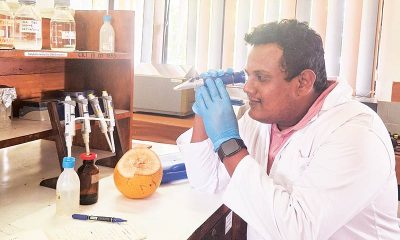
 Life style5 days ago
Life style5 days agoKing of coconuts heads for a golden future
-
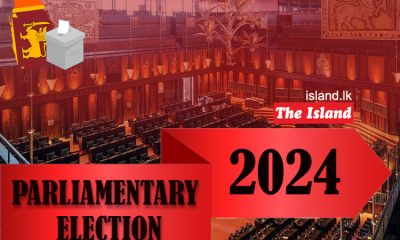
 Latest News6 days ago
Latest News6 days agoColombo district preferential votes announced
-
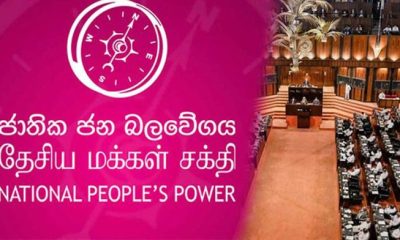
 News4 days ago
News4 days agoNPP appoints two defeated candidates as NL MPs
-
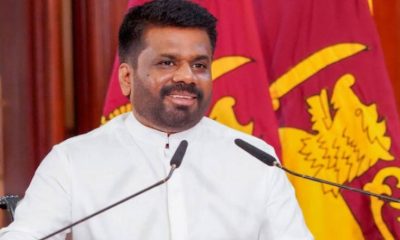
 News6 days ago
News6 days agoPresident warns his party: “We will fail if we view power as an entitlement to do as we please”
-
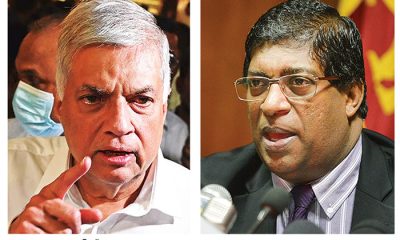
 News3 days ago
News3 days ago‘Gas Cylinder’ explodes; Ranil flays NDF Secy. for submitting Ravi’s name
-
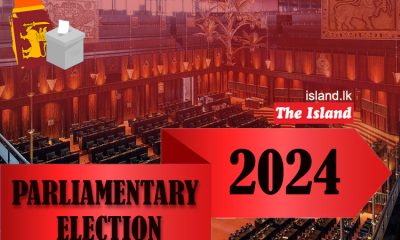
 Latest News6 days ago
Latest News6 days agoGampaha district: NPP 16, SJB 3
-
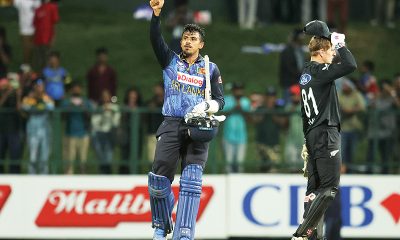
 Sports3 days ago
Sports3 days agoMaking batting compulsory for bowlers has worked – Theekshana
-

 Editorial6 days ago
Editorial6 days ago‘Maroon Wave’ and AKD Magic











